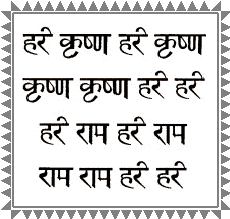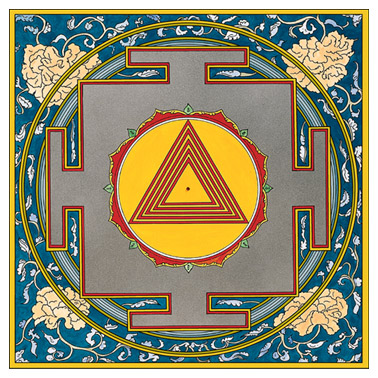
Mantras
A mantra is
a holy syllable or a verse
we pray with. With use of mantras we come nearer the Gods we worship.
Dhumavati Mantra
!!!BEWARE,
DEMONS WORSHIP DHUMAVATI!!!
First, do something good for people who help us all
keep the clear mind. Support OpenBSD
or FreeBSD.
Sanatana Dharma's
conception of "demons" is a
little if not too different from the Christian
one. The ancient meaning of the word "demon"
or "daemon" was different than it is today. Plato,
too, writes about "demons" without associating them to something
bad. Demons are known in Islam, too. The term "jinn"
is the equivalent of it. In Islam, bad "jinns" are called
shaya-ti-n (not the "demons"
that worship Dhumavati) and Iblis (Satan) is their leader.
Dhumavati is not evil;
She only represents the most powerful negative energies of the fearful
God. A lot of people use mantras and Tantras
for ignorant purposes only (New
Age, etc.) - to gain powers or "magic", but this is
not the way to approach Dhumavati, because She lightens the deepest
areas of our mind that even the best doctors are not aware of. Dhumavati
is one of the greatest wisdom teachers and with Her
negative (that is - angry and sad) dark face She only wants
us to see the positive face of God. She
is the Goddess that loves but to see Her beauty you must pay Her certain
respect (and a tax). Dhumavati is the first form of Supreme
Goddess (later known as Parvati) - that is, Sati, the Lord
Shiva's first wife. She was hungry and Shiva refused to serve
Her, so She swallowed Him. Shiva then
asked Her to disgorge Him - She did and He cursed her. She thus became
an eternal widow. She is also embodied in the sad smoke of the sacrificial
funeral pyre (therefore Her color is red
and black). She forever lives in it with Sati who burned
herself. Dhumavati is Sati and the grandmother spirit and one
of the Mahavidyas (ten great wisdom Goddesses). Her Vedic equivalent
is Nirrti (goddess of death and corruption). The
Dhumavati Mantra:
devIm koteshvarIm shuddhAmpApaghnIm kAmarUpinIm
namAmi muktikAmAya dehi muktim harapriye
(the capitalization in transliteration means that the vowel
is to be pronounced with an accent)
!!!BEWARE,
DEMONS WORSHIP DHUMAVATI!!!
A mantra is practiced by vocalizing a mystical syllable
or verse, most frequently in Sanskrit, but this is not a rule. For
example, there are mantras like:
Aum Bhur Bhuva Svaha
(Aum) Tat Savitur Varenyam
Bhargo Devasya Dhi-mahi
Dhiyo Yo Nah Prachodayat, (Aum) 
OR
(To challenge a direction from ignorance to truth)
Asato ma- sad gamaya
Tamaso ma- jyotir gamaya
Mr.tyorma- amr.tam gamaya
Aum ťa-nti ťa-nti ťa-ntih.
Aum sahanaavavatu
Sahanau bhunaktu
Saha viiryan karavaavahai
Tejasvi naavadhiitamastu
Maa vidvishhaavahai
On the picture above are mantras (Hare Krishna) written
in Sanskrit. This language still lives, but it is used only in religious
prayers (like Latin in Christian churches); people normally do not
use it (Sanskrit) for ordinary communication.
Saraswati mantra will improve memory and concentration
in learning:
SARASWATI NAMASTHUBHYAM
VARADE KAMARUPINI
VIDHYARAMBAM KARISHYAMI
SIDDHIR BAVATHUME SADHA
Ganesha mantra
jaya ganeťa jaya ganeťa jaya ganeťa
deva
mata jaki parvati pita mahadeva
Shakti mantras
The names of Mother Divine
are mantras, too, as Mother Divine
can bestow Her energy to us.
1. Chamunda Parianganatha
- Governor of sacred assembly.
2. Kali Nitya Siddhamata
- Mother of the Siddhas.
3. Nagalakali
- Kali of Naga.
4. Kurukulla Rasanatha
- Emperor of physical pleasure.
5. Tripuresi -
She who is the head of three cities.
6. Ghana MahaJagadamba
- Great Mother of the world.
7. Maha Kali Siddhesvari
- Queen of the Siddhas.
8. Dakini Madasalini
- Shining with rapture.
9. Sarvaruna
- Mother with a reddish color of the dawn.
kula-vidyA mantra
(Kula or Kaula is a type
of Hindu tantrism; the word Kula
or Kaula is difficult to translate, but its meaning
is close to something like "family").
tatashchAnu paThedenAM kulavidyAM
samAhitaH |
aulA nIlA khalA kAlA nakulA grahakArikA ||
senA susenA mAtA cha mahAsenA yashasvinI |
kR^itamAlAkSatashirA etAstu graha-mAtaraH ||
kumAra-vachanAch-ChIghraM pramu~nchantu shishuntvimam |
kAla-kalpA jvalach-ChaktiH ki~NkiNI-jAla-bhUShitA ||
kumAra-vachanAd-dUtI samprAptA muchyatAM shishuH |
patAkA kukukTaH ChatraM ghaNTA-barhadharaH shikhI ||
sharastambhash-cha te mudrA muchyatAM mAtaraH shishuH
Chatuhsasthi Yogini Mantras
64 Sacred Names of Kali
(or Bhairavi) are pronounced, here are only eight of them (which
can be repeated eight times to get the number 64):
1. Maha Kali Siddhesvari
- Queen of the Siddhas
2. Kapalini Nagalakshmi - Lakshmi of
Naga
3. Kula Devi Svarnadeha - The One of
golden body
4. Kurukulla Rasanatha - The Ruler of
pleasure
5. Nila Bhukti Rakta Sparsha - Who receives
pleasure from passion
6. Ghana MahaJagadamba - Great Mother
of the world
7. Kameshvari Sarvashakti -
Shakti of all
8. Bhagamalini Tarini -
The One Who delivers us from calamity
I am especially interested in Sri
Kamadi (6th Yogini) and Sri Khemukhi
(63rd Yogini). Give salutations to Sri Kamadi:
Sri mAtrE namasthE chinmAtrE sEvita
ramA hareeSa vidhAtrE
vAmAdi Sakti poojita para dEvatAyAhsakalam jAtam
kAmAdi dwAdaSabhirupAsitakAdi hAdi sAdi mantra roopiNyAh
prEmAspada guru guha jananyAm preeti yukta matchittAm vilayatu
brahma maya prakASini nAma roopa vimarSini
kAma kalA pradarSini sAmarasya nidarSini
Then Sri Khemukhi
may come like a long-beaked bird at night. (In
the circle) 15 + 1 is the number for Lord Shiva
(15) and Lord Ganesh (1). 63 and
6 and 15 and 1 means
that the circle of Yoginis has a special meaning. 15 + 1 gives 16.
If 16 is multiplied by four, you get 64.
Look here
to learn something about 64 Yoginis.
Nagini Mantras
Nagini is the word used to call the female counterparts
of deities called "snake deities"
in Hinduism. The mantras for these snake deities are:
(the vowels like "aa" are pronounced with an accent like
in the English word "are")
Om Puuh Anantamukhii Swaahaa
Om Puuh Karkodamukhii Swaahaa
Om Puuh Padminii Swaahaa (Padmavati)
Om KaalaJiihvaa Puuh Swaahaa
Om Mahaapadminii Swaahaa
Om Vaasukiimukhii Swaahaa
Om Hum Hum Puurvabhuupamukhii Swaahaa
Om Shankhni Vaayumukhii Hum Hum
Back


